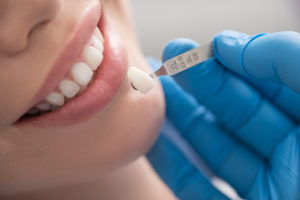Pregnant? Learn more about the changes to expect from your Seattle dentist!
What To Expect For Your Oral Health During Pregnancy
In this week’s blog our Seattle dentist Amanda Guerrero, DDS discusses what changes to expect in your mouth during pregnancy.
Pregnancy causes many hormonal changes which increase the risk of the expectant mother to develop gingivitis, periodontal disease and other changes in the mouth.

Gingivitis
Gingivitis (inflammation of the gum tissue) is a mild form of gum disease that causes gums to be red, tender and sore. You can prevent gingivitis by keeping your teeth clean. We may even recommend more frequent cleanings to help control gingivitis during your pregnancy.
Erosion (Loss of Tooth Structure)
Morning Sickness is something many pregnant women experience and unfortunately, it can be damaging to your teeth. The acid in your vomit will lower the pH of your mouth and in turn, increase the risk of acid erosion in your teeth.
There are steps you can take to protect your teeth!
Start by eating small amounts of nutritious yet non-cariogenic (non-cavity forming) foods – snacks rich in protein such as cheese – throughout the day.
And although you might reach for that toothbrush and toothpaste right after an episode, don’t! Instead, use a teaspoon of baking soda (sodium bicarbonate) in a cup of water to rinse and spit after vomiting. Don’t brush your teeth immediately afterwards. We want to avoid brushing directly after vomiting, as the effect of erosion can be exacerbated by brushing an already demineralized (and softened) tooth surface.
Using gentle tooth brushing and fluoride toothpaste twice daily to prevent damage to teeth and use a fluoride-containing mouth rinse immediately before bedtime to help remineralize teeth.
Pyogenic Granuloma (Pregnancy Tumor)
Hormones also play a major role in the occurrence of Pyogenic Granulomas, or Pregnancy Tumors. But don’t worry, these aren’t actual tumors. Pyogenic granulomas are relatively common skin growths that are small, round, and usually bloody-red in color. They tend to bleed because they contain a very large number of blood vessels. A pyogenic granuloma occurs after injury, or in the case of your mouth, gum irritation from calculus (tartar). It starts off as a lesion with a rapid growth period that usually lasts a few weeks and then becomes a raised, reddish nodule that’s typically smaller than 2 centimeters. The growth you have can appear smooth, or it might have a crusty or rough surface, particularly if it bleeds a lot. While the appearance may be a bit disconcerting, the growth is completely benign and we wait until after pregnancy for removal. With all those changing hormones, it will just grow back!
Periodontal Disease
Periodontal disease generally begins with a bacterial infection in the gum tissue (gingivitis), which left untreated, progressively destroys the tissue and the underlying bone. The bacterial infection causes an inflammatory reaction in the body, which can significantly deepen the gum pockets (space between the teeth and gums) and forces the gum and jawbone to recede. Eventually, the progressive nature of periodontal disease causes the teeth to become loose and unstable, and eventually fall out.
Why is this such a big issue for pregnant women?
Periodontal disease – gum disease – may play a roll in the development of preeclampsia, a potentially deadly condition that affects approximately 5% of pregnancies in the U.S., reports an April 2013 study in the Journal of Periodontology. Another study found that women with periodontal disease were 7 times more likely to deliver low-birth-weight babies prematurely.
There are many safe, nonsurgical treatment options available for pregnant women at your Seattle dentist. It is of paramount importance to halt the progress of periodontal disease in order to increase the chances of a safe and healthy delivery.
Initially, we will assess the exact condition of the gums and jawbone in order to make a precise diagnosis. Scaling and root planing are two common non-surgical procedures used to rid the tooth-root surfaces of calculus (tartar) and remove the bacterial toxins from the gum pockets.
Regular visits to your Seattle dentist along with good oral hygiene, which includes brushing and flossing, is a step toward ensuring overall health. During pregnancy, oral health care is just as important as proper nutrition, hydration, prenatal vitamins, exercise and plenty of rest!
Schedule your appointment with Amato Dental Group at 206-626-5400.

